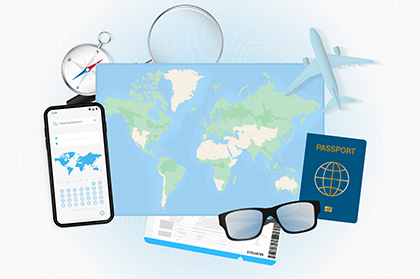Top Nursing Courses in Australia for International Students
Here are a few reasons WHY you should consider studying nursing and embark on your path to a successful career. Australia is...
Wondering how to manage your expenses in Australia? Here’s our guide to help you!
Studying abroad can be very expensive, but the key to managing your expenses is to plan your budget wisely so that you can keep a firm grip on your finances. When calculating the estimated cost of studying in Australia, make sure to include expenses such as accommodation, food, health insurance, and travel in addition to your tuition fee. This will allow you to better plan your budget.
Costs for English Proficiency Test
In order to apply for Australia, you have to pass your English Proficiency Test i.e. IELTS or PTE. You can prepare for these tests by yourself but you can also get professional guidance which will cost you from NRS. 5,000 to NRS. 15,000 or more depending on the institution.
Similarly, your IELTS Registration fee will be NRS. 25,300 for Paper-Based IELTS test and NRS. 23,650 for the Computer-delivered IELTS test. And the Registration fee for PTE exams is USD 180 from Nepal.
Financial Capacity required to apply for a student visa for Australia from Nepal
In order to apply for your student visa, there are requirements for the visa applicant to be able to afford all the costs associated with the study in Australia.
The estimated bank balance required for an Australian student visa from Nepal are:
above figures depend upon courses, locations, and education institutions
Looking for Step by Step Student Visa process for Australia from Nepal? Click here.
The first expense that you’ll have to shell out while studying abroad in Australia is your student visa. An Australian student visa costs approximately $606 i.e., 52,312.33 NRS. However, there are many subclasses of visas that are available for international students in Australia. You can contact Vevs counselor for the most recent updates and information on the visa application process and associated costs.
| Visa subclass | Base application charge | Additional applicant charge 18 and over | Additional applicant charges under 18 | Subsequent temporary application charge |
|---|---|---|---|---|
| Student visa (subclass 500) | $630 | $470 | $155 | $700 |
| Student visa (subclass 500) (subsequent entrant) | $630 | $470 | $155 | $700 |
| Student visa (subclass 500) – Foreign Affairs or Defence sector | nil | nil | nil | nil |
| Student visa (subclass 500) – Postgraduate research sector | $630 | nil | nil | nil |
| Student Guardian (subclass 590) | $630 | nil | nil |
Source: https://immi.homeaffairs.gov.au/visas/getting-a-visa/fees-and-charges/current-visa-pricing/study
Your study costs in Australia will be determined by the type of qualification you pursue and the university or school you attend. For example, if you are in Australia pursuing Veterinary and medical degrees, your study costs are significantly more expensive than other degrees. However, tuition fees at Australia’s tertiary institutions typically range between AUD 20,000 and AUD 30,000 per year.
The table below provides a general idea of the range of course costs (yearly) for various types of qualifications.
| Study Program | Average fees in AUD* 1 AUD = 86.55 (2/16/2022) |
|---|---|
| School | $7,800 to $30,000 annually 6,75,108.55 to 25,96,571.36 NRS |
| English language studies | $350-450 weekly (varies as per course length) 30,293.33 to 38,948.57 NRS |
| Vocational Education and Training (Certificates I to IV, Diploma and Advanced Diploma) | $4000 – $22,000 annually 3,46,209.51 to 19,04,152.33 NRS |
| Undergraduate Bachelor’s degree | $20,000 – $45,000* annually 17,31,047.57 to 38,94,857.03 NRS |
| Postgraduate Master’s Degree | $22,000 – $50,000* annually 19,04,152.33 to 43,27,618.93 NRS |
| Doctoral Degree | $18,000 – $42,000* annually 15,57,942.81 to 36,35,199.90 NRS |
*Please note all figures are indicative
Source: https://www.studyaustralia.gov.au/english/live/living-costs
Most Australian universities provide on-campus housing for international students. Moreover, You can also choose off-campus housing, where you can share apartments with other Nepalese students or stay with a local Australian family. Rent is usually paid in advance every two weeks. Keep in mind that rental rates differ from city to city.
This table shows approximate rents for different housing options in Australian cities.
| Accommodation type | Expenses (Indicative) 1 AUD = 86.55 (2/16/2022) |
|---|---|
| Hostels and Guesthouses | $90 to $150 per week 7,769.16 to 12,948.60 NRS |
| Shared Rental | $95 to $215 per week 8,200.78 to 18,559.65 NRS |
| On-campus | $110 to $280 per week 9,495.64 to 24,170.71 NRS |
| Homestay | $235 to $325 per week 20,286.13 to 28,055.29 NRS |
| Rental | $185 to $440 per week 15,969.94 to 37,982.55 NRS |
Source: https://www.studyaustralia.gov.au/english/live/living-costs
While the biggest expenses for you while studying in Australia will be your study costs and accommodation costs, you will have to keep some money aside for your weekly grocery shopping, social life, and other emergencies. Additionally, it’s always a good idea to keep track of your expenses so that your budget is on track and you don’t overspend as well.
Here’s a list of some day-to-day expenses that you’ll have to budget for while living as an international student in Australia.
| Living expenses | Weekly budget (indicative) 1 AUD = 86.55 (2/16/2022) |
|---|---|
| Groceries and eating out | $140 to $280 12,085.36 to 24,170.71 NRS |
| Gas, electricity | $10 to $20 863.24 to 1,726.48 NRS |
| Phone and Internet | $15 to $30 1,294.86 to 2,589.72 NRS |
| Public transport | $30 to $60 2,589.72 to 5,179.44 NRS |
| Car (after purchase) | $150 to $260 12,948.60 to 22,444.23 NRS |
| Entertainment | $80 to $150 6,905.92 to 12,948.60 NRS |
Source: https://www.studyaustralia.gov.au/english/live/living-costs
Australia has a very developed network of public transport in most Australian Cities. So, when students go to study in Australia from Nepal, Weekly transportation around Australian cities will cost you around $30 to $60 depending on the city and your schedule. Opal card is the smart ticketing system that will get you around in Sydney whereas Myki will get you around in Melbourne. These cards will cost you approximately $50 a week.
International students pursuing formal studies in Australia, as well as their dependents (spouses and children under the age of 18), must obtain OSHC (Overseas Student Health Cover). It includes coverage for
You’ll have to spend an average of $500 annually for your OSHC in Australia depending on the insurance provider.
While you get to work part-time as an international student in Australia then you will need to acquire a Tax File Number (TFN) to be able to work. Similarly, you are permitted to work 20 hours per week during academic sessions and full-time during vacations under this arrangement. If you choose to work in addition to your studies, your earnings will be taxed, but the good news is that the majority of international students are eligible for a tax refund at the end of the year. Part-time students in Australia pay an average of 15.5% income tax on their earnings.
Read blogs about all aspects of living, studying and working in Australia.

Here are a few reasons WHY you should consider studying nursing and embark on your path to a successful career. Australia is...

What is the best way to receive an Australian PR from Nepal? If you are considering permanent residency in another nation from...

If you're thinking about applying for a PR (Permanent residency) in Australia, don't give up. It's a fantastic idea for your future....

Travel to Australia from Nepal Coral reefs, gorgeous sandy beaches, and some scary creatures come to mind when we think of Australia....